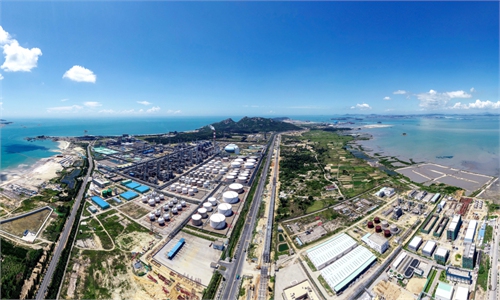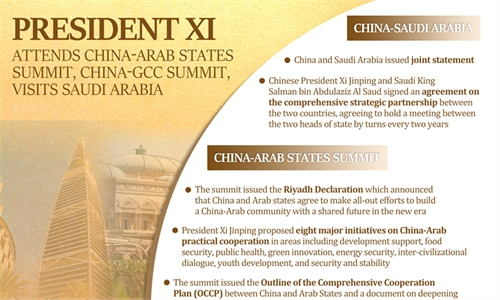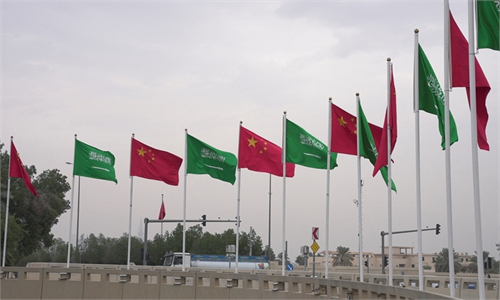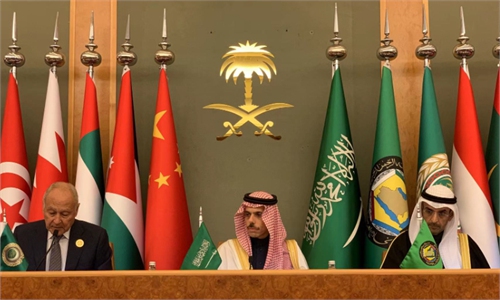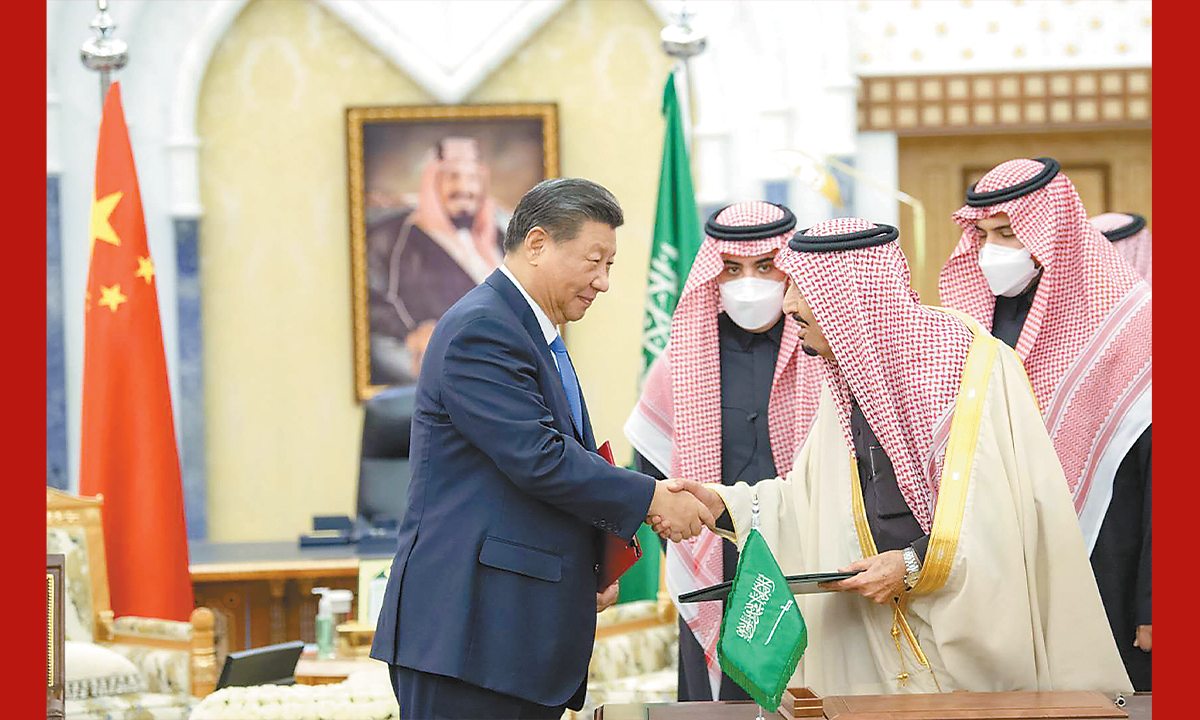
Chinese President Xi Jinping meets with King Salman bin Abdulaziz Al Saud of Saudi Arabia at Riyadh’s al-Yamamah Palace in Saudi Arabia on December 8, 2022. Photo: Xinhua
Chinese President Xi Jinping on Saturday concluded his Saudi Arabia trip, his first to the Middle East region after the 20th National Congress of the Communist Party of China, which was also an unprecedented diplomatic event with the Arab world. The trip has not only yielded fruitful results in economic and trade sense, but also demonstrated that in addition to continuing to play the role of a contributor to regional development, China will also increasingly contribute to peace in the strategically important Middle East, experts noted.Xi departed Riyadh Saturday after attending the first China-Arab States Summit and the China-Gulf Cooperation Council (GCC) Summit and paying a state visit to Saudi Arabia from December 7 to 10.
During his stay in Saudi Arabia, Xi also held bilateral meetings with nearly 20 Arab leaders, said Wang Yi, State Councilor and Foreign Minister, deeming Xi's Mideast trip as China's largest and highest-level diplomatic action with the Arab world since the founding of the People's Republic of China.
Calling Xi's attendance at the first China-Arab States Summit and the China-GCC Summit and his meetings with leaders of Saudi Arabia another great pioneering undertaking in China's diplomacy, Wang said it has demonstrated the strategic choice of China and Arab countries to strengthen solidarity and coordination in the face of global challenges.
Fruitful results
Following the first China-Arab States Summit on Friday, the leaders of China and the member states of the Arab League issued the Riyadh Declaration, agreeing to strengthen cooperation and enhance the China-Arab strategic partnership. China and Arab states are committed to deepening China-Arab cooperation in various fields through the mechanisms under the framework of the China-Arab States Cooperation Forum. The declaration stressed that the Arab states firmly adhere to the one-China principle, support China in safeguarding its sovereignty and territorial integrity, and reaffirm that Taiwan is an inseparable part of China's territory.
China and states of the GCC also agreed on Friday to strengthen their strategic partnership, issuing a joint statement to stress the importance of taking their strategic partnership into a new era in such fields as politics, economy and culture.
China and Saudi Arabia released a joint statement on the same day affirming to continue making the China-Saudi relationship a priority in their respective foreign relations, and build a model of solidarity and cooperation for mutual benefits among developing countries. The two countries also agreed to enhance the comprehensive strategic partnership to include a biannual meeting between the two heads of state, and upgrade regular high-level talks led by premier level.
"We will continue to work very closely with each other to not just serve the interests of our country, but to serve the interests of world peace and global cooperation," Saudi Arabian Foreign Minister Prince Faisal bin Farhan Al Saud, said responding to a question raised by Global Times reporter during a press conference in Riyadh on Friday evening.
China as Saudi Arabia's main key partner is one of the Kingdom's priorities in the country's foreign policy and Saudi Arabia is very satisfied that it has a strong working relationship with China, the minister said.
China does not engage in advocating for geopolitical small clique and does not make calculation for geopolitical interests, and it treats Arab countries with sincerity, which is widely welcomed by countries in the region, Wang noted. Many leaders of the regional countries said that there is no upper limit for the friendly cooperation with China, he said.
"In my opinion, this visit is a milestone in the history of China-Arab relations, marking the continuous development of China-Arab friendship and ushering in a new era of cooperation and coordination," Firas Fadel Hassan, editor of the Emirates News Agency, told the Global Times.
It has provided an opportunity for leap-forward development of China-Arab relations. The summits emphasized the importance and necessity of strengthening and deepening strategic exchanges and coordination among friendly countries, and are committed to promoting world peace and global development, and safeguard the interests of the Gulf and Arab countries, Hassan said.
China's propositions during the summits will help promote the development of both sides, improve the economic situation, improve the living standards of both Chinese and Arab people, the editor continued. They will promote international trade, enhance China's international image, enhance China's international competitiveness, while promote the development of Arab countries.
Besides the energy sector in which China and the Gulf countries have been deepening cooperation, the two sides agreed to explore cooperation in many new areas especially in cutting-edge technologies such as 5G and 6G, digital economy and space, echoing the trend of the cooperation between China and Arab countries in the future.
"Those milestone summits largely elevate the cooperation mechanisms between China and Arab countries, making the future high-level interactions between the two sides more frequent and more significant," Liu Zhongmin, a professor at the Middle East Studies Institute of Shanghai International Studies University, told the Global Times on Sunday.
The meetings were also unprecedented, attracting nearly all the Arab countries and covering as many areas as possible ranging from trade and economy to culture as well as people-to-people exchange, Liu noted. "They also included strategic coordination including China-proposed Global Security Initiative and Global Development Initiative, helping China and Arab countries to jointly cope with increasing uncertainties in global governance," he said.
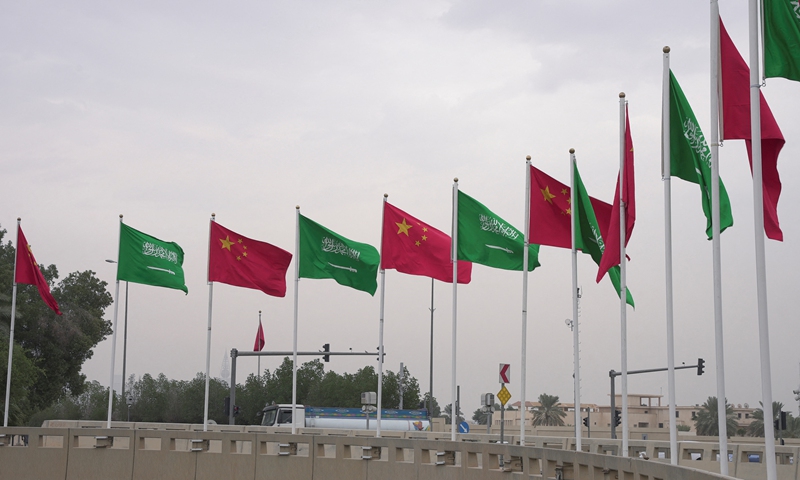
The national flags of China and Saudi Arabia are seen on the street of Riyadh ahead of the China-Arab States Summit on December 7, 2022. Photo: thepaper.cn
Role of ChinaThe West has been closely watching this unprecedented interaction between China and the Middle East region in the past few days as there is inevitable comparison between Xi's visit and the visit of US President Joe Biden in July when he told Arab leaders that the US won't walk away from the Middle East.
Following Xi's visit, Chinese Vice Premier Hu Chunhua would be visiting the United Arab Emirates and Iran in a four-day trip starting on Saturday, according to Xinhua News Agency.
Some Chinese experts believe that besides continuing pushing forward Middle East's development, China will also continue serving as a guardian of peace in the region, especially after the Chinese top leader elaborated on regional security issues ranging from Palestine to Yemen to Libya in the latest joint statements with Arab countries and GCC.
For instance, in the joint statement between China and Saudi Arabia, the two sides agreed on the need to strengthen joint cooperation to ensure the peaceful nature of Iran's nuclear program. The two sides also called on Iran to cooperate with the International Atomic Energy Agency, maintain the non- proliferation regime, and emphasize respect for the principles of good- neighborliness and non-interference in internal affairs of states.
In the joint statement between China and GCC, when it comes to the issue of the three islands -- the Greater Tunb, Lesser Tunb and Abu Musa - the leaders emphasized their support for all peace efforts, including the initiative and efforts of the UAE for negotiations in line with the norms of the international law.
"In line with China-proposed Global Security Initiative, China is looking to play a constructive role on the security issues in the Middle East, emphasizing on the importance of the solidarity and pushing forward a joint and sustainable security perspective," Liu said.
With the US engaging in a strategic contraction in the Middle East and intensifying competition with China and Russia, the overall ability and willingness of the US to invest in the Middle East also decline but it hopes Middle Eastern countries will cooperate on its strategy in controlling energy prices and imposing sanctions against Russia, some experts said.
"More Middle Eastern countries are avoiding choosing sides, and are adopting a balanced stance among major powers. The latest summits and Saudi Arabia's high-level reception all show that the importance and rising influence of China in the region are indisputable," Liu said.


